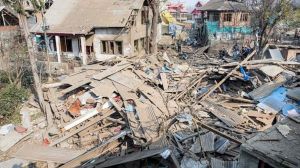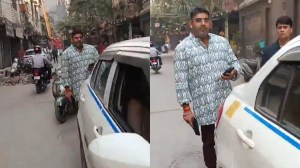Oxford: Sonia slams Pak, snipes at BJP
She seemed to be on home turf, a place where she met her husband 35 years ago, where the greatest of her family patriarchs Jawaharlal Nehru ...

She seemed to be on home turf, a place where she met her husband 35 years ago, where the greatest of her family patriarchs Jawaharlal Nehru got his Tripos and where her mother-in-law went to college. After reviving this family bond, Sonia Gandhi unveiled her world vision at the prestigious Oxford University Centre for Islamic Studies.
The centre has benefited in the past from grants from the Bin Laden family, a fact that the BJP yesterday used to slam her visit. Affiliated to the reknowned Magdalene College, it’s currently headed by Farhan Nizami, a native of Lucknow and considered to be one of the leading internatiomnal scholars of Islam.
In her speech ‘Conflict and Co-existence in Our Age,’ she took a swipe at the BJP and the Sangh Parivar—without, of course, naming them—and virtually replayed the Government’s severe condemnation of Pakistan and an oblique criticism of the US.
Her arguments were predictable; the prescriptions were familiar too. In essence, she argued that the Nehruvian vision of creating democratic, secular, equitable and tolerant societies could still provide answers to the modern scourge of terrorism.
Sonia began her speech with Islam’s contribution to India’s rich and diverse culture. She quoted Maulana Azad that ‘‘India’s soil should become the destination of many different caravans of races, cultures and religions.’’
Without naming the BJP, she said: ‘‘In recent years some political parties have been proclaiming that India belongs to the majority community. But have no doubt. Although their voices are loud and figure prominently in the media, they are handful. Secularism is India’s destiny.’’
Referring to September 11, Sonia Gandhi said ‘‘international terrorist networks do not seem to have a hold on Indian Muslims.’’ And that’s because India’s political and social framework is able to accommodate plurality.
She accused Pakistan of exporting cross-border terrorism and said that Pakistan provides a ‘‘ready handle to those who stoke communal passions in India.’’ There are also religious and political leaders on both sides, she said, ‘‘who feed on each other’s passions.’’
Sonia Gandhi argued that terrorism couldn’t be dealt within ‘‘a selective and segmented manner.’’ Without naming the Unites States she said: ‘‘The approach that says, ‘‘the terrorism I face is of higher priority than the terrorism you face…It’s illogical and has dangerous implications for global stability and security.’’
Then floating away from realpolitik, she temporarily swerved into political philosophy. ‘‘A globalisation process that is seen to be inequitable and destabilising of the culture moorings can trigger terrorist mindsets. A political system that is closed and does not fulfil the aspirations of the people can create conditions with encourage dangerous ideologies.’’
She advanced familiar arguments that the US desire to take action against Iraq through the United Nations was in essence a recognition of multilateralism; that South Asian nations, the home of one-fifth of humanity, must collectively address common economic and social problems and that Palestinian people must have a viable state, while Israelis must live within secure borders.
Her remedy to all these problems was what Nehru laid before the world almost 50 years ago, the doctrine of Panchsheel.
‘‘It is natural that India should champion co-existence amongst the nations of the world. Panchsheel, the five principles of peaceful co-existence derived from Buddha’s teachings and given contemporary relevance by Jawaharlal Nehru.’’
This was Sonia Gandhi’s big hour at one of the world’s major universities and where as India’s leader of Opposition she unfolded her world view before some of the UK’s top university dons and high-commissioners and diplomats of countries like, Kuwait, Morocco, Sri Lanka, South Africa and Japan.
Photos




- 01
- 02
- 03
- 04
- 05



























